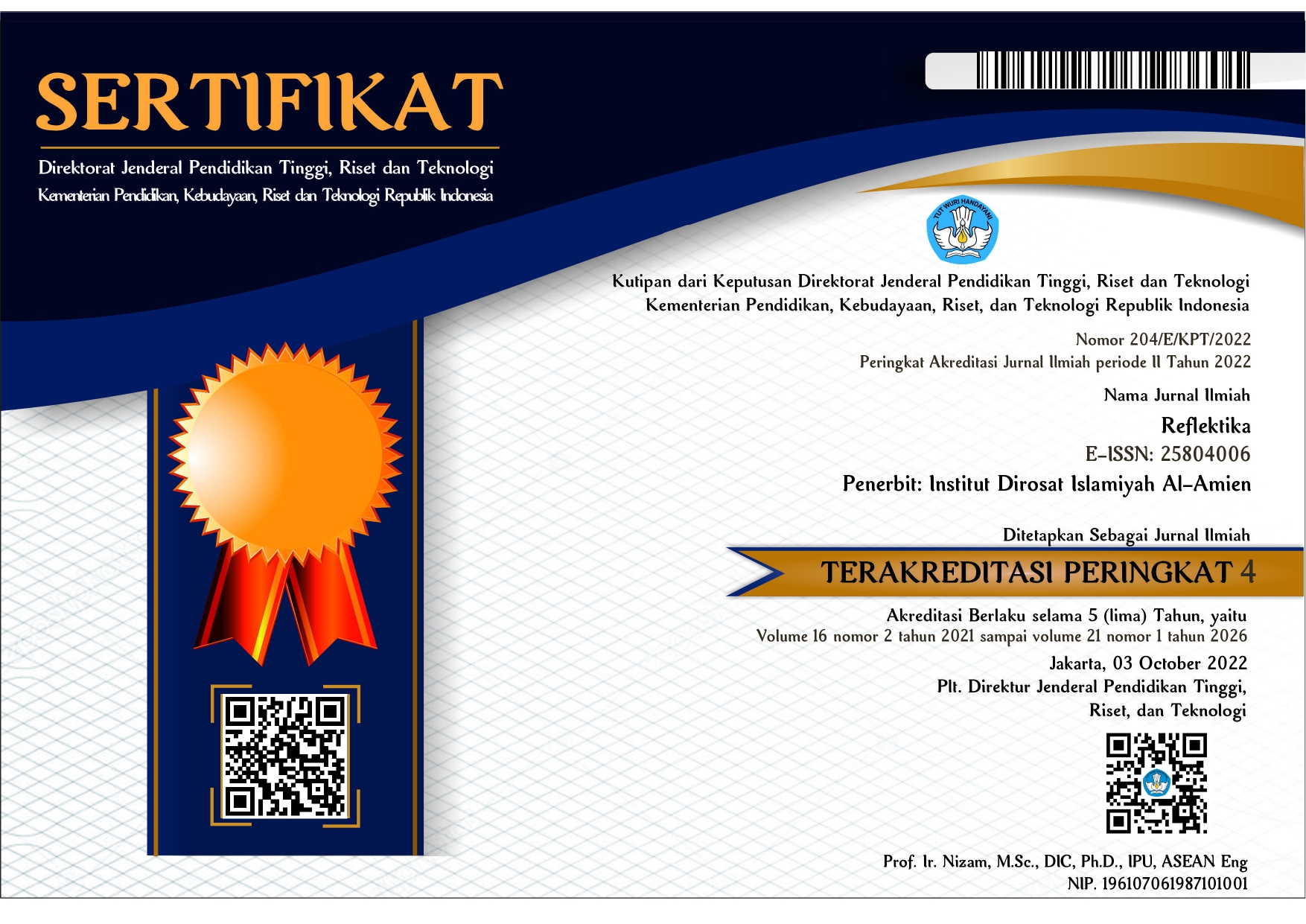INVESTIGATING EFL STUDENTS’ PERCEPTION IN READING COMPREHENSION THROUGH GOOGLE CLASSROOM
Abstract
Keywords
References
Azmuddin, R. A., Fariza, N., Nor, M., & Hamat, A. (2020). Facilitating Online Reading Comprehension in Enhanced Learning Environment Using Digital Annotation Tools Volume 8 – Issue 2 IAFOR Journal of Education: Technology in Education Volume 8 – Issue 2 IAFOR Journal of Education: Technology in Education Vol. IAFOR Journal of Education: Tehcnology in Education, 8(2), 7–27.
Burt, Miriam; Peyton, Joy Kreeft; Adams, R. (2003). Reading and Adult English Language Learners: A Review of the Research. National Center for ESL Literacy Education (NCLE).
Dewi, N., Zahrowati, E., & Sulistyawati, M. E. S. (2019). the Implementation of Google Classroom in Improving Students’ Reading Comprehension At Man 4 Jakarta. ANGLO-SAXON: Jurnal Ilmiah Program Studi Pendidikan Bahasa Inggris, 10(2), 105. https://doi.org/10.33373/as.v10i2.2097
Kiili, C., & Leu, D. J. (2019). Exploring the collaborative synthesis of information during online reading. Computers in Human Behavior, 95, 146–157. https://doi.org/10.1016/j.chb.2019.01.033
Maskur, R., Syazali, M., & Utami, L. F. (2019). Islamic-Nuanced Calculus Module with Open-Ended Approach in Real Number System Material. Journal of Physics: Conference Series, 1155(1). https://doi.org/10.1088/1742-6596/1155/1/012081
Mohammadian, A., Saed, A., & Shahi, Y. (2018). The Effect of Using Video Technology on Improving Reading Comprehension of Iranian Intermediate EFL Learners. Advances in Language and Literary Studies, 9(2), 17. https://doi.org/10.7575/aiac.alls.v.9n.2p.17
Muri, A.,Yusuf .(2017). Metode Penelitian: Kuantitatif, Kualitatif, Dan Penelitian Gabungan. Jakarta: Kencana
Oktaria, A. A., & Rahmayadevi, L. (2021). Students’ Perceptions of Using Google Classroom During the Covid-19 Pandemicc. International Journal of Educational Management and Innovation, 2(2), 153. https://doi.org/10.12928/ijemi.v2i2.3439
Rafiqi, Iqbal, Fatati Nuryana, Maftuhatul Faizah, and Achmad Jufri, ‘INVESTIGASI PERAN FEE BASED INCOME TERHADAP PROFITABILITAS (ROA) DI BANK SYARIAH INDONESIA (Studi Kasus Pada PT. Bank Syariah Mandiri Periode 2005-2014)’, 1.2 (2020), 123–44 https://doi.org/10.28944/masyrif.v1i2.474
Sabran, & Sabara, E. (2019). Keefektifan Google Classroom sebagai media pembelajaran. Prosiding Seminar Nasional Lembaga Penelitian Universitas Negeri Makasar, 122–125.
Saputri Y. A., Rizal S., A. Z. L. (2020). An Analysis of English Teachers’ Strategies in Teaching Reading Comprehension. Jadila: Journal of Development and Innovation in Language and Literature Education, 4(2003). https://doi.org/10.52690/jadila.v1i3.125
Sing, P. B., Embi, M. A., & Hashim, H. (2019). Ask the Assistant: Using Google Assistant in Classroom Reading Comprehension Activities. International Journal of New Technology and Research, 5(7), 39–43. https://doi.org/10.31871/ijntr.5.7.6
Subandowo, M., Asri Humaira, M., Rusmiati Aliyyah, R., Rachmadtullah, R., Samsudin, A., & Nurtanto, M. (2020). Use of Blended Learning with Moodle: Study Effectiveness in Elementary School Teacher Education Students during The COVID-19 pandemic Hibah Disertasi View project Developing diagnostic test formed in Four Tier-Test and Conceptual Change Model with PDEODE*. International Journal of Advanced Science and Technology, 29(7), 3272–3277. https://www.researchgate.net/publication/341724918
Sugiono. (2018). metode penelition pendidikan. Bandung: Alfabeta.
Susanti, L., Junining, E., & Hamamah, H. (2021). Investigating the Implementation of Google Classroom To Improve Reading Comprehension: Advantage and Disadvantage. Journal of Languages and Language Teaching, 9(2), 204. https://doi.org/10.33394/jollt.v9i2.3491
Wahyuningsih, D., & Muis, A. R. (2020). Male Students’ Reading Comprehension Difficulties. AL- e Study of Master of English Education of the Second Semester at STKIP PGRI Sidoarjo). Magister Scientiae.(48) https://doi.org/10.33508/mgs.v2i48.2802.
William, D., & Marilynn, B.(2015) Principles and Methods. New York: Routledge.
DOI: 10.28944/reflektika.v16i2.531
Refbacks
- There are currently no refbacks.


.png)

